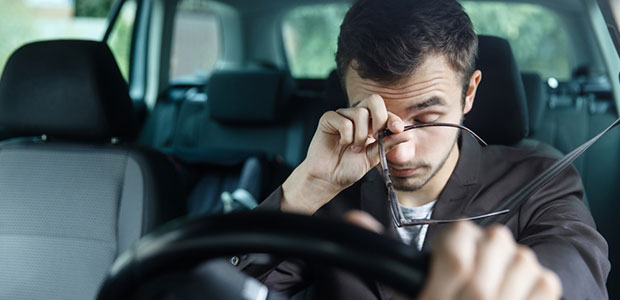
Daylight Savings Kicks off Drowsy Driving Prevention Week
Even though Americans gained an hour of sleep this past weekend, workers are still urged to prioritize sleep—especially because driving drowsy is comparable to driving intoxicated.
Hopefully, the daylight savings "fall back" gave you an extra hour of sleep last weekend. However, most Americans don’t get enough sleep in the first place, so and even with the extra hours of sleep, workers are susceptible to fatigue and workplace risks.
Researchers are not the only ones worried that sleep deprivation affects employee safety—Americans report they are concerned for their own health, too. One NSC probability-based survey found that 70 percent of Americans are worried that their sleep habits impact their physical health, and 67 percent are worried about the effects of their mental wellbeing.
Yet, despite this widespread concern, only 43 percent say they “frequently” get enough sleep to feel their best the next day.
Physical and mental health aside, many don’t think about how sleep affects a person’s health and safety in the workplace, too. Fatigue in the workplace is an epidemic—and it can have some serious effects. One NSC article notes that every American (97 percent) has at least one risk factor for fatigue, such as sleep loss or working long hours. And what’s more, fatigue costs the U.S. economy some $400 billion annually.
Nov. 3 did give us an extra hour of needed sleep time. Yet, sleep deprivation is a widespread problem. Even losing two hours of sleep can have the same effect as drinking three beers, NSC notes; and everyone knows, trying to drive, work, or function while influenced by substance (or fatigue) is unhealthy and dangerous.
One OSH article notes the following workplace effects fatigue can have on the average tired worker:
- reduced decision making, ability to do complex planning, communication skills, productivity or performance, attention and vigilance, reaction time in speed and thought
- loss of memory of the ability to recall details
- failure to respond to changings in surroundings or information provided
- inability to stay awake (e.g., falling asleep while operating machinery or driving a vehicle)
- increased tendency for risk-taking, increased forgetfulness, errors of judgement, sick time, absenteeism, medical costs, and incident rates
With the "fall back" last weekend, it is only timely that the National Sleep Foundation (NSF) announce Nov. 3-10 as Drowsy Driving Prevention Week.
The NSF’s annual campaign goal is to reduce the number of drivers who elect to drive while sleep deprived. Remember that driving fatigued is comparable to driving while under the influence of alcohol? Driving tired is just as dangerous as driving drunk—and drowsy driving is responsible for more than 6,400 U.S. deaths annually. Fall asleep crashes are often caused by voluntarily not getting the sleep you need, but many Americans lose sleep as a result of sleep disorders like sleep apnea and narcolepsy.
It is incredibly important to routinely get enough sleep, and not just this week after daylight savings. Personal habits as well as workplace support can help you be better about getting those z’s. NSC says to address fatigue in the workplace, employers are encouraged to:
- Use the NSC Fatigue Cost Calculator to assess their organization’s unique risks. The calculator provides custom reports on the benefits and losses of a tired workplace
- Implement a sleep health program at work using the Fatigue at Work Employer Toolkit, which includes sample policies, implementation guidance, 5-minute safety talks, research and educational materials for employees
- optimize employee schedules so that they are working appropriate hours and are not overworked and integrate sleep education into wellness programs, according to Axiom Medical
While employers have a hand in employee sleep routines, the individual can focus on healthy home habits, too:
- avoid alcohol, caffeine, and electronic screens before bedtime
- use blackout curtains and turn down the temperature in your bedroom for the most ideal sleep environment
- go to bed at the same time each night—humans are creatures of habit
Our clocks gave us an extra hour of sleep this week, but we are yawning on our way to work, and the NSF instituted awareness about drowsy driving. Getting sleep is important to prioritize all the time, as it affects everything from personal health and wellbeing to workplace safety. Your health is more contingent on it than many realize.